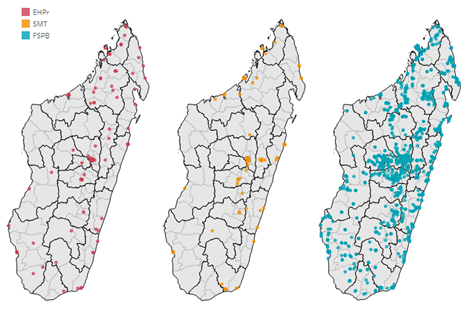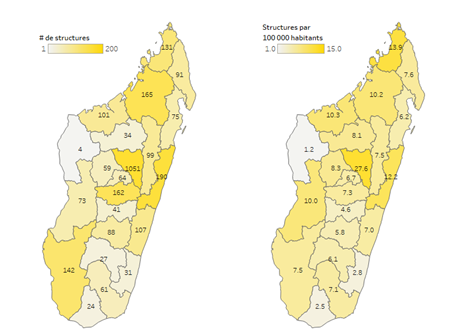Census reveals key role of the private sector in Madagascar’s health system
More than half (52 percent) of clinical health facilities in Madagascar are private, according to the first private health sector census conducted in the country. Since 2019, SHOPS Plus has worked with the Ministry of Health’s Information System Studies and Planning Department (DEPSI) and private sector stakeholders to enumerate all private health facilities in the country (pharmacies and drug shops are excluded) and collect information on their location, characteristics, health services, and more. The absence of reliable information about the private health sector in the country is one of the main obstacles the government faces in engaging with the private sector. The census, which covered all 22 regions in the country, is an important step toward better understanding the private sector’s contribution to the health system and leveraging its role.
On June 3, 2021, SHOPS Plus shared the census findings with 50 stakeholders, which included representatives from the Ministry of Health, USAID, USAID implementing partners, and private health sector actors. At the event, USAID Mission Deputy Director of Health, Population and Nutrition Dr. Hajarijaona Razafindrafito emphasized the Mission’s commitment to supporting the private sector as a major player in Madagascar’s health system.
Key findings
SHOPS Plus identified 3,090 private health facilities in Madagascar and surveyed 2,841 of them. The census found that there are approximately 13,700 private health sector professionals throughout the country. There is a strong concentration (37 percent) of private facilities in Analamanga, the capital region. It also found 73 percent of the facilities surveyed offer infant and child health services, 63 percent offer maternal health services, 61 percent offer family planning services, and 77 percent offer malaria services. On average, 44 percent of private facilities attend to suspected COVID-19 cases. Most facilities (78 percent) are for-profit and 32 percent accept some form of health insurance. In addition, 44 percent are female-owned and about one third (30 percent) are affiliated with networks, franchises, associations, or NGOs. The vast majority (90 percent) of private facilities collaborate with the public sector in some capacity.
Using the findings for increased collaboration
SHOPS Plus handed over the census database to the DEPSI along with a tool for analysis. The Ministry will use the data to better understand the private sector’s role in the health system and guide policy development to foster collaboration. The DEPSI will also use the census results to update the master facility list in DHIS2. To further support public-private engagement, SHOPS Plus will share the database with the Private Health Sector Group (Groupement du Secteur Privé de la Santé, GSPS). The GSPS will use the data to better structure the private sector, foster collaboration, and identify opportunities to strengthen private sector capacity.

